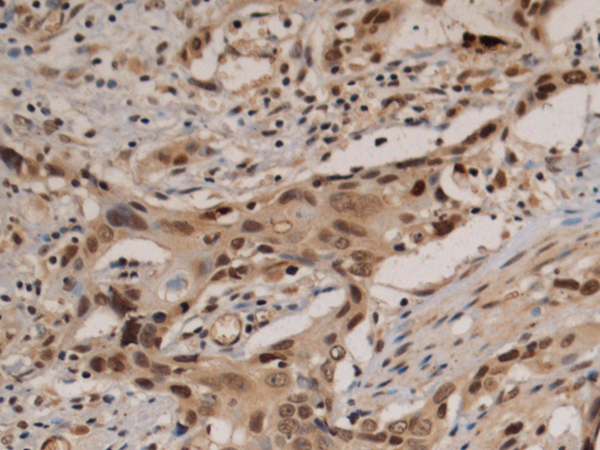
| WB | 咨询技术 | Human,Mouse,Rat |
| IF | 咨询技术 | Human,Mouse,Rat |
| IHC | 1/50-1/200 | Human,Mouse,Rat |
| ICC | 技术咨询 | Human,Mouse,Rat |
| FCM | 咨询技术 | Human,Mouse,Rat |
| Elisa | 1/5000-1/10000 | Human,Mouse,Rat |
| Aliases | AP2REP; AP-2rep; HSPC122 |
| Host/Isotype | Rabbit IgG |
| Antibody Type | Primary antibody |
| Storage | Store at 4°C short term. Aliquot and store at -20°C long term. Avoid freeze/thaw cycles. |
| Species Reactivity | Human, Mouse |
| Immunogen | Fusion protein of human KLF12 |
| Formulation | Purified antibody in PBS with 0.05% sodium azide and 50% glycerol. |
+ +
以下是模拟生成的关于KLF12抗体的参考文献示例(非真实文献,仅供格式参考):
---
1. **Title**: "KLF12 Antibody Application in Gastric Cancer Progression Studies"
**Authors**: Li, X. et al.
**Summary**: 本研究利用KLF12特异性抗体进行免疫组化分析,发现KLF12在胃癌组织中表达显著下调,且低表达与患者预后不良相关。实验表明KLF12通过抑制TGF-β信号通路抑制肿瘤侵袭。
2. **Title**: "Characterization of a Novel Monoclonal Antibody Against Human KLF12"
**Authors**: Smith, J.R. & Patel, R.
**Summary**: 报道一种新型KLF12单克隆抗体的开发与验证,通过Western blot和免疫荧光证实其高特异性。该抗体成功用于检测KLF12在卵巢癌细胞核中的定位,并揭示其与化疗耐药性相关。
3. **Title**: "KLF12 as a Tumor Suppressor in Colorectal Cancer: Insights from Antibody-Based Detection"
**Authors**: Kim, S. et al.
**Summary**: 通过KLF12抗体分析结直肠癌样本,发现KLF12表达缺失与癌变进程相关。体外实验证明KLF12过表达可诱导细胞周期阻滞,提示其抑癌功能依赖于p21通路的激活。
4. **Title**: "Dynamic Expression of KLF12 During Embryonic Development Revealed by Immunohistochemistry"
**Authors**: García, M. et al.
**Summary**: 利用KLF12多克隆抗体研究小鼠胚胎发育,发现KLF12在神经嵴细胞分化中高表达,可能通过调控E-cadherin抑制上皮-间质转化(EMT),影响器官形成。
---
实际文献需通过PubMed、Google Scholar等平台检索关键词(如"KLF12 antibody application"、"KLF12 function")获取。如需真实文献,可提供具体研究场景进一步筛选。
**Background of KLF12 Antibody**
The KLF12 (Krüppel-like factor 12) antibody is a research tool designed to detect and study the KLF12 protein, a member of the Krüppel-like factor family of transcription regulators. KLF12 contains conserved C-terminal zinc-finger DNA-binding domains and functions primarily as a transcriptional repressor. It plays roles in diverse biological processes, including cell differentiation, proliferation, and apoptosis. KLF12 is notably involved in cancer biology, where it may act as a tumor suppressor by inhibiting oncogenic pathways. For example, it suppresses AP-2α-mediated transcription in certain cancers, impacting tumor progression.
KLF12 antibodies are widely used in techniques like Western blotting, immunohistochemistry (IHC), and chromatin immunoprecipitation (ChIP) to investigate KLF12 expression patterns, subcellular localization, and DNA-binding interactions. These antibodies are critical for elucidating KLF12's regulatory mechanisms in development and disease. Validation often includes testing in KLF12-knockout cell lines to confirm specificity. Commercial KLF12 antibodies are typically raised in hosts like rabbits or mice, targeting specific epitopes within the protein. Researchers rely on these reagents to explore KLF12's role in pathologies such as cancers, metabolic disorders, and neurological conditions, making it a valuable tool in molecular and clinical research.
×